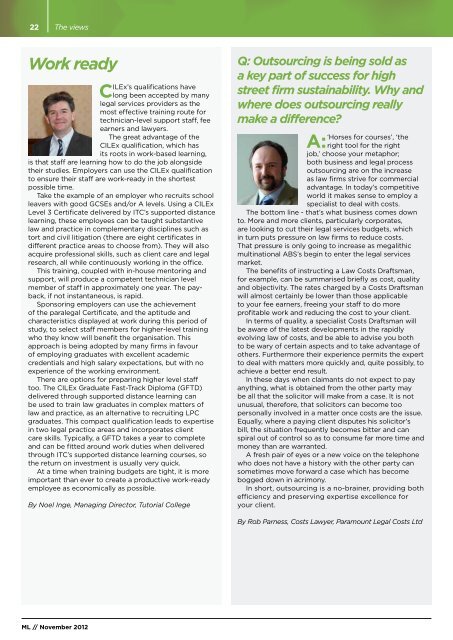Michael Napier
Michael Napier - Modern Law Magazine
Michael Napier - Modern Law Magazine
You also want an ePaper? Increase the reach of your titles
YUMPU automatically turns print PDFs into web optimized ePapers that Google loves.
22The viewsWork readyCILEx’s qualifications havelong been accepted by manylegal services providers as themost effective training route fortechnician-level support staff, feeearners and lawyers.The great advantage of theCILEx qualification, which hasits roots in work-based learning,is that staff are learning how to do the job alongsidetheir studies. Employers can use the CILEx qualificationto ensure their staff are work-ready in the shortestpossible time.Take the example of an employer who recruits schoolleavers with good GCSEs and/or A levels. Using a CILExLevel 3 Certificate delivered by ITC’s supported distancelearning, these employees can be taught substantivelaw and practice in complementary disciplines such astort and civil litigation (there are eight certificates indifferent practice areas to choose from). They will alsoacquire professional skills, such as client care and legalresearch, all while continuously working in the office.This training, coupled with in-house mentoring andsupport, will produce a competent technician levelmember of staff in approximately one year. The payback,if not instantaneous, is rapid.Sponsoring employers can use the achievementof the paralegal Certificate, and the aptitude andcharacteristics displayed at work during this period ofstudy, to select staff members for higher-level trainingwho they know will benefit the organisation. Thisapproach is being adopted by many firms in favourof employing graduates with excellent academiccredentials and high salary expectations, but with noexperience of the working environment.There are options for preparing higher level stafftoo. The CILEx Graduate Fast-Track Diploma (GFTD)delivered through supported distance learning canbe used to train law graduates in complex matters oflaw and practice, as an alternative to recruiting LPCgraduates. This compact qualification leads to expertisein two legal practice areas and incorporates clientcare skills. Typically, a GFTD takes a year to completeand can be fitted around work duties when deliveredthrough ITC’s supported distance learning courses, sothe return on investment is usually very quick.At a time when training budgets are tight, it is moreimportant than ever to create a productive work-readyemployee as economically as possible.By Noel Inge, Managing Director, Tutorial CollegeQ: Outsourcing is being sold asa key part of success for highstreet firm sustainability. Why andwhere does outsourcing reallymake a difference?‘Horses for courses’, ‘theA: right tool for the rightjob,’ choose your metaphor;both business and legal processoutsourcing are on the increaseas law firms strive for commercialadvantage. In today’s competitiveworld it makes sense to employ aspecialist to deal with costs.The bottom line - that’s what business comes downto. More and more clients, particularly corporates,are looking to cut their legal services budgets, whichin turn puts pressure on law firms to reduce costs.That pressure is only going to increase as megalithicmultinational ABS’s begin to enter the legal servicesmarket.The benefits of instructing a Law Costs Draftsman,for example, can be summarised briefly as cost, qualityand objectivity. The rates charged by a Costs Draftsmanwill almost certainly be lower than those applicableto your fee earners, freeing your staff to do moreprofitable work and reducing the cost to your client.In terms of quality, a specialist Costs Draftsman willbe aware of the latest developments in the rapidlyevolving law of costs, and be able to advise you bothto be wary of certain aspects and to take advantage ofothers. Furthermore their experience permits the expertto deal with matters more quickly and, quite possibly, toachieve a better end result.In these days when claimants do not expect to payanything, what is obtained from the other party maybe all that the solicitor will make from a case. It is notunusual, therefore, that solicitors can become toopersonally involved in a matter once costs are the issue.Equally, where a paying client disputes his solicitor’sbill, the situation frequently becomes bitter and canspiral out of control so as to consume far more time andmoney than are warranted.A fresh pair of eyes or a new voice on the telephonewho does not have a history with the other party cansometimes move forward a case which has becomebogged down in acrimony.In short, outsourcing is a no-brainer, providing bothefficiency and preserving expertise excellence foryour client.By Rob Parness, Costs Lawyer, Paramount Legal Costs LtdML // November 2012




